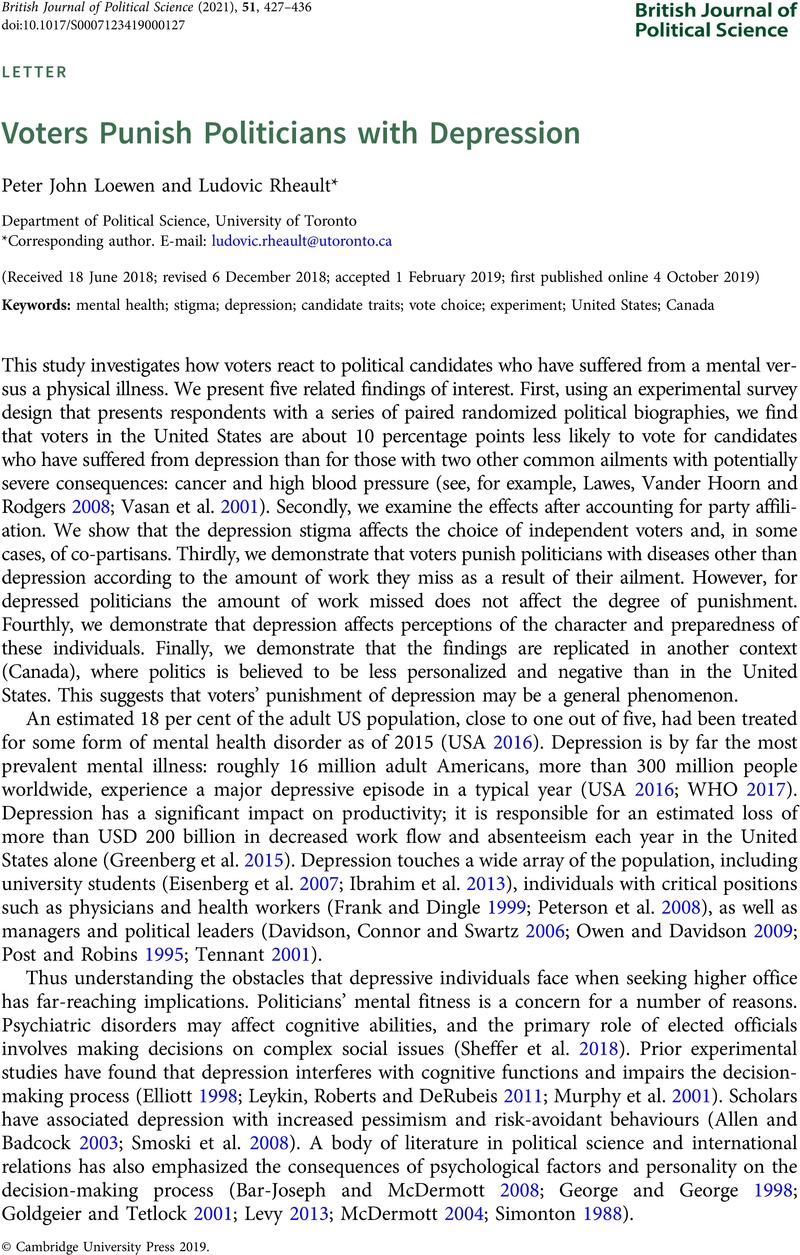Crossref Citations
This article has been cited by the following publications. This list is generated based on data provided by Crossref.
Reher, Stefanie
2021.
How Do Voters Perceive Disabled Candidates?.
Frontiers in Political Science,
Vol. 2,
Issue. ,
Bernardi, Luca
2021.
Mental Health and Political Representation: A Roadmap.
Frontiers in Political Science,
Vol. 2,
Issue. ,
Weinberg, James
2021.
Emotional labour and occupational wellbeing in political office.
The British Journal of Politics and International Relations,
Vol. 23,
Issue. 3,
p.
430.
Magni, Gabriele
and
Reynolds, Andrew
2022.
The Persistence of Prejudice: Voters Strongly Penalize Candidates with HIV.
Political Behavior,
Vol. 44,
Issue. 4,
p.
1843.
Smith, Alexander J.
Graña, Juan
Alibudbud, Rowalt
Ventriglio, Antonio
Buadze, Anna
and
Liebrenz, Michael
2024.
Mental health and the ballot box: A correlational analysis of Google searches for mental health and national election periods in the United States and the United Kingdom from 2008 to 2020.
International Journal of Social Psychiatry,
Vol. 70,
Issue. 6,
p.
1155.
Druckman, James N.
2024.
How to study democratic backsliding.
Political Psychology,
Vol. 45,
Issue. S1,
p.
3.
Baum, Matthew A
Druckman, James N
Ognyanova, Katherine
and
Schulman, Jonathan
2024.
Misperceptions, Depression, and Voting for Election Deniers in the United States.
International Journal of Public Opinion Research,
Vol. 36,
Issue. 2,
Magni, Gabriele
and
Reynolds, Andrew
2024.
Voter attitudes and politicians with health conditions and disabilities.
Social Science Quarterly,
Vol. 105,
Issue. 6,
p.
1923.
Smith, Alexander J.
Theil, Stefan
Weinberg, Ashley
Bhugra, Dinesh
and
Liebrenz, Michael
2025.
Mental health, medical incapacity, and political leadership in the United Kingdom: A multidisciplinary analysis of the intersections between psychiatry and constitutional law.
International Journal of Law and Psychiatry,
Vol. 101,
Issue. ,
p.
102109.
Schaffner, Brian F.
Hershewe, Thomas
Kava, Zoe
Strell, Jael
and
Daoust, Jean-François
2025.
Do conservatives really have better mental well-being than liberals?.
PLOS One,
Vol. 20,
Issue. 4,
p.
e0321573.
Bergeron, Thomas
Amsalem, Eran
Sheffer, Lior
Joly, Jeroen
and
Loewen, Peter John
2025.
What personality traits do citizens want politicians to have? Observational and experimental evidence of citizens' preferences in three countries.
Political Psychology,
Reher, Stefanie
2025.
Voting for Disabled Candidates.
The Journal of Politics,
Vol. 87,
Issue. 2,
p.
790.
Smith, Alexander
Hachen, Stefanie
Weinberg, Ashley
Falkai, Peter
Guttormsen, Sissel
and
Liebrenz, Michael
2025.
The weight of office? A scoping review of mental health issues and risk factors in elected politicians across democratic societies.
International Journal of Social Psychiatry,
Vol. 71,
Issue. 2,
p.
223.



